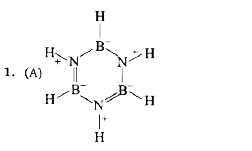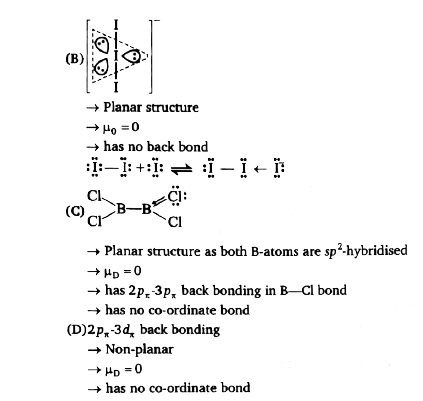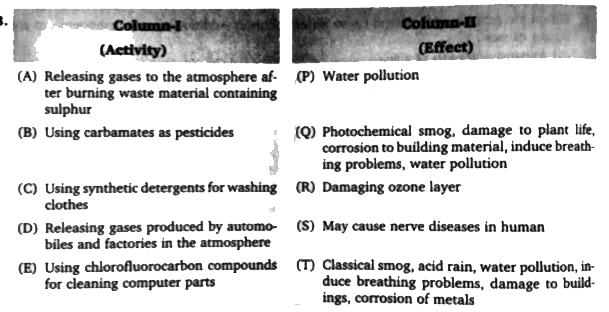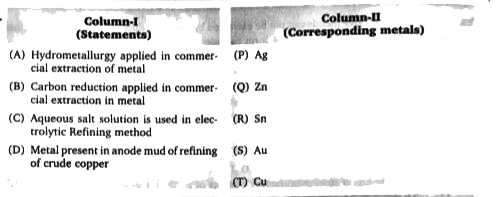Column-I and Column -II contains four entries each. Entries of Column-I are to be matched with some entries of Column-II. One or more than one entries of Column-I may have the matching with the same entries of Column-II.

The correct Answer is:A, B, C, D

→ Planar as both B and N are sp2-hybridized
→μo=0 (non-polar)
→ has 2pπ−2pπ back bonding between B-N bond.
→ has no co-ordinate bond

Topper's Solved these Questions
- CHEMICAL BONDING (BASIC)BOOK - VK JAISWAL ENGLISHCHAPTER - CHEMICAL BONDING (BASIC)EXERCISE - ASSERTION-REASON TYPE QUESTIONS
23 Videos
- CHEMICAL BONDING (BASIC)BOOK - VK JAISWAL ENGLISHCHAPTER - CHEMICAL BONDING (BASIC)EXERCISE - SUBJECTIVE PROBLEMS
54 Videos
- CHEMICAL BONDING (BASIC)BOOK - VK JAISWAL ENGLISHCHAPTER - CHEMICAL BONDING (BASIC)EXERCISE - ONE OR MORE ANSWERS IS / ARE CORRECT
46 Videos
- CHEMICAL BONDING (ADVANCED)BOOK - VK JAISWAL ENGLISHCHAPTER - CHEMICAL BONDING (ADVANCED)EXERCISE - SUBJECTIVE PROBLEMS
64 Videos
- CO-ORDINATION COMPOUNDSBOOK - VK JAISWAL ENGLISHCHAPTER - CO-ORDINATION COMPOUNDSEXERCISE - LEVEL 2
144 Videos
Similar Questions
Column-I and Column-II contains fore enteries each. Entries of Column-I are to be matched with, some entries of Column-II One or more than one entries of Column-I may have the mathching with the same entries of Column-II

View SolutionColumn-I and Column-II contains four entries each. Entries of Column-I are to be matched with some entries of Column-II. Each entry of Column-I may have the matching with one or more than one entries of Column-II

View SolutionColumn-I and Column-II contains four entries each. Entries of Column-I are to be matched with some entries of Column-II. Each entry of Column-I may have the matching with one or more than one entries of Column-II

View SolutionColumn-I and Column-II contains four entries each. Entries of Column-I are to be matched with some entries of Column-II. Each entry of Column-I may have the matching with one or more than one entries of Column-II

View SolutionColumn-I and Column-II contains four entries each. Entries of Column-I are to be matched with some entries of Column-II. Each entry of Column-I may have the matching with one or more than one entries of Column-II

View SolutionColumn-I and Column-II contains four entries each. Entries of column-I are to be matched with some entries of column-II. Each entry of column-I may have the matching with one or more than one entries of column-II.

View SolutionColumn-I and Column-II contains four entries each. Entries of column-I are to be matched with some entries of column-II. Each entry of column-I may have the matching with one or more than one entries of column-II.

View SolutionColumn-I and Column-II contains four entries each. Entries of column-I are to be matched with some entries of column-II. Each entry of column-I may have the matching with one or more than one entries of column-II.

View SolutionColumn-I and Column-II contains four entries each. Entries of column-I are to be matched with some entries of column-II. Each entry of column-I may have the matching with one or more than one entries of column-II.

View SolutionColumn-I and Column-II contains four entries each. Entries of column-I are to be matched with some entries of column-II. Each entry of column-I may have the matching with one or more than one entries of column-II.

View Solution
